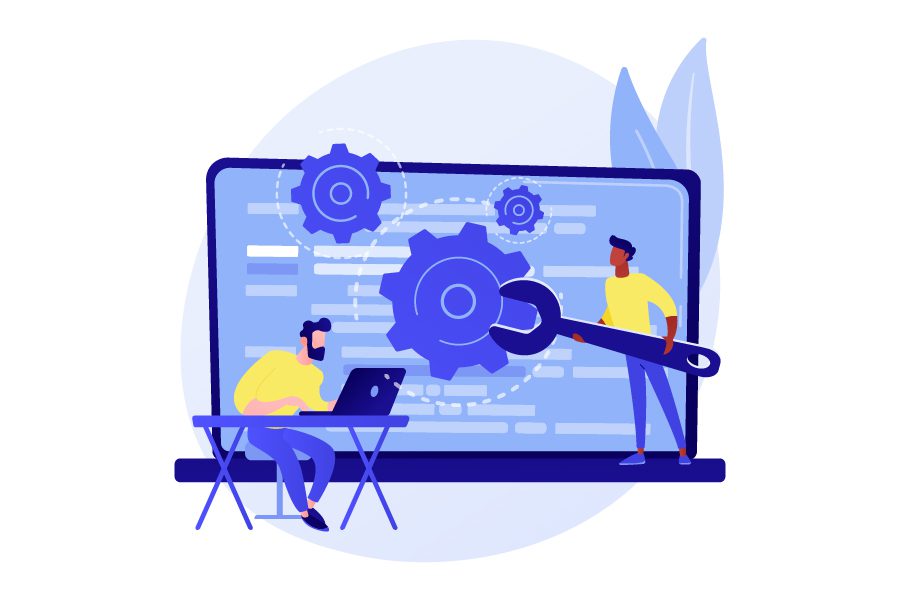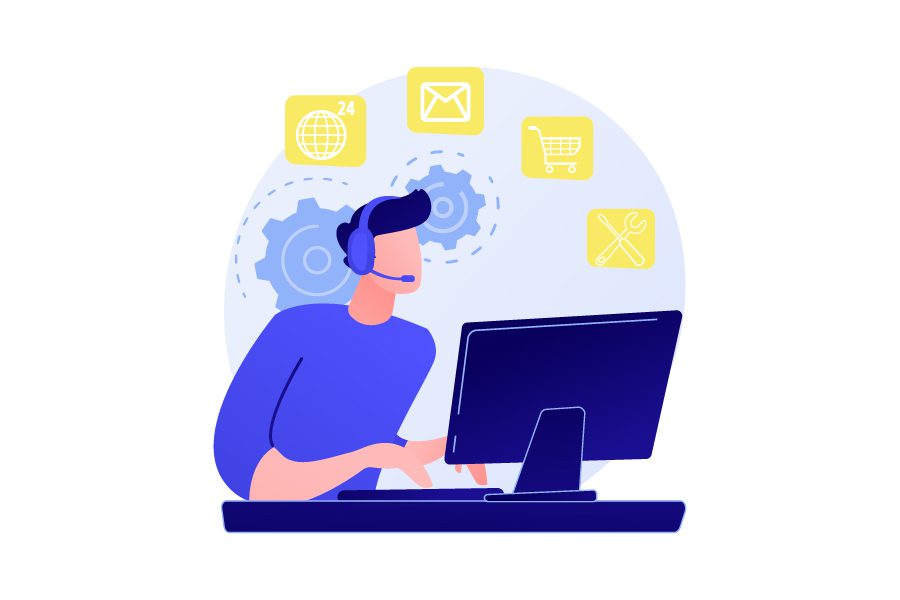Any business trying to dominate the online marketplace needs to employ the latest search engine optimization tactics to ensure success. Yet, many fail to realize that over-using SEO methods to satisfy the search engines can backfire on their results. So, why is over optimizing bad?
Since our team at CLICKVISION SEO specializes in cutting-edge services, we want to explain what over-optimization is and which practices to avoid. By highlighting some of the main disadvantages, you’ll learn how to avoid them.
We also want to explain how you can balance optimization for SEO success and give you tips we’ve learned through our experience. Continue reading to discover the negative effects of over-optimizing and how to prevent them!

Source: freepik.com
What Is Over-Optimization?
As the name implies, over-optimization is the practice of making too many SEO-related improvements, which negatively affects your website’s quality and ranking opportunities. Even though this practice used to bring positive results in the past, search engine algorithms have drastically changed throughout the years.
If link spamming and keyword stuffing were the go-to methods to getting ranked in the old days, now they will only harm your ranking chances. This is due to the over-optimization penalty Google set in place as of April 2012.
However, since the SEO scene is ever-evolving, many businesses don’t realize that some techniques may be considered over-optimizing. Based on the latest changes in search engine algorithms, here are some over-optimization practices you should know:
- Utilizing multiple H1s on a single page
- Using keyword-rich anchors for internal linking
- Using non-relevant keywords
- Pointing all links to top-level navigation pages
- Linking to irrelevant sites
- Non-branded and keyword-dense URLs
- Keyword-stuffing the footer
Why Is Over Optimizing Bad?
There are several downfalls when implementing such strategies that will lower your chances of ranking. The ones that have the biggest impact are the following:
- Negative impact on user experience
- Search engine penalties
- Keyword stuffing and its consequences
- Content relevancy and natural language
- Link building pitfalls
Negative impact on user experience
When trying to rank higher on Google’s search results, the one factor you should always consider is the user experience. Many over-optimization efforts result from the idea that the website should appeal more to search engine crawlers than visitors. However, failing to include a user-centric design with easy navigation and undisrupted functionality will only lead to a negative user experience.
Since most visitors tend to visit a website searching for information, it’s important always to tailor the content to the reader. Focusing solely on the optimization perspective may result in repetitive and dull content without value.
When that happens, the user experience may be compromised, leading to higher bounce rates and lower engagement. The results may impact your organic rankings later because both UX and SEO use similar metrics.

Source: freepik.com
Search engine penalties
Another negative effect you can expect from over-optimization is the dreaded search engine penalties. Renowned search engines like Google have ever-evolving algorithms to try and create a pleasant and valuable experience for their users. Thus, the over-optimization penalty Google implemented in 2012, as well as the Panda and Penguin algorithm updates, were designed to target sites that implement such tactics.
While some minor penalties may include a temporary drop in your ranking, the worst-case scenario may get your website completely de-indexed from the search engine results. Even though you may get a lighter penalty, recovering from such a ranking drop is time-consuming and complex, affecting your SEO efforts in the long run.
Keyword stuffing and its consequences
As mentioned, keyword stuffing used to be the go-to method for ranking in the old days. However, there are numerous consequences related to this practice in today’s modern age. Keyword stuffing is the process of excessively repeating keywords within specific content to rank higher for the said keywords.
Since search engines like Google highly value the user experience, they’ve taken numerous measures to combat the keyword stuffing practice. So, failing to comply with Google’s rules will put you at risk of being flagged as spam, drastically lowering your chances of getting properly ranked.
Content relevancy and natural language
Related to user experience and keyword stuffing, over-optimizing leads to issues regarding content relevancy and the use of natural language. Instead of tricking the search engine algorithm, the over-optimizing practice only leads to poorly written content that sounds unnatural.
Hence, the readability and flow of the content will be disrupted. Still, it will also lack the necessary information the users are searching for, leading to higher bounce rates and lower user satisfaction.
Link building pitfalls
The last issue you should be wary of is the link-building pitfalls. Many businesses make the mistake of incorporating aggressive link-building strategies to get as many backlinks as possible.
Even though backlinking has always played a vital role in ranking, Google has implemented various algorithm changes, such as the Penguin update. It targets unnatural link profiles on websites.
So, relying on low-quality or irrelevant backlinks acquired through link schemes, link purchasing, and excessive link exchanges may result in penalties. The best way to ensure higher ranking through link building is to create a natural and diverse link profile achieved through organic link acquisition.
What Is Black Hat SEO?
Another term we want to elaborate on that’s intertwined with over-optimizing is black hat SEO. This practice is defined as a set of actions that go against search engine guidelines to achieve a higher SERP ranking.
The term “black hat” originates from old Western movies where this accessory was used to distinguish the bad guys from the good ones. In today’s modern age, this phrase is commonly used for those indulging in unethical actions online, including hackers and virus creators. Some of the most common black hat SEO practices are the following:
- Paying for links
- Content automation
- Reporting competitors
- Utilizing hidden text or links
- Keyword stuffing
- Link schemes and farms
- Guest posting networks
- Creating pages, domains, and subdomains with duplicate content
While many businesses are tempted to try black hat tactics for faster results, they can be very harmful in the long run. Remember that search engines like Google are very strict towards such rule infringements, and getting caught will result in a sudden drop in ranking and even de-indexation.
Tips on Preventing Over-Optimization
Now that you’re well-informed about over-optimization and its practices, we also want to give you tips on preventing it. Here are the best ways to ensure your website doesn’t get penalized by using over-optimization techniques:
- Creating quality content: When creating content for your website, ensure it includes valuable information for the readers. The written text should also include natural language and flow for the users to skim through it easily.
- Quality link-building practices: Since link-building plays an essential part in any SEO strategy, it’s important to focus on acquiring organic and high-quality backlinks.
- Reducing keyword density: You should focus on finding only the most relevant keywords for your content and spread them out in a way that doesn’t disturb the content flow. Even though you may be tempted to include as many keywords as possible, it’s better to handpick the ones with the biggest relevance to the topic.
Even if you may already have trouble with over-optimization on some pages, you can always go back to them and fix the issues. If you’ve noticed that some of your blogs contain too many keywords, you can focus on rewriting and condensing them.

Source: freepik.com
Conclusion
Why is over optimizing bad? After discovering its negative effects on your search ranking opportunities and user satisfaction levels, we recommend avoiding this practice. There’s a fine line between the strategic use of SEO practices and employing tactics just for the sake of it.
Since we realize how difficult it may be to find suitable optimization tactics if you don’t have any prior experience, our team at CLICKVISION SEO offers the ideal solutions for various business needs. Our cutting-edge search engine optimization services aim to elevate your online visibility and drive digital success for your businesses.
With a team of SEO professionals, we’ll help guide you through the ever-evolving landscape of search engine algorithms and ensure you stay ahead of the competition. Plus, having customer satisfaction as our main goal, you’ll gain access to the latest SEO methodologies, data-driven insights and proven optimization techniques.
So, if you’re looking for ways to maximize your online reach and enhance organic traffic, contact CLICKVISION SEO today. We’ll find the best solutions for your circumstances!
